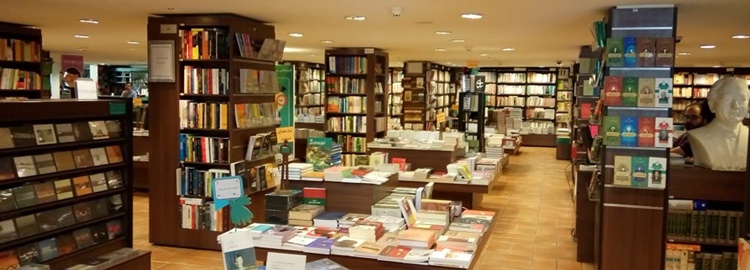
A diverse range of cultural products are produced
and distributed in Iran, which contribute to the economy.
In an exclusive interview with Financial Tribune, Mehdi Firouzan, the managing director of Book City Company, shared his views on the problems and solutions concerning production and distribution of cultural products, including books, in Iran.
Book City, founded in 1996, is an Iranian cultural product chain store. With 87 stores throughout the country, the company accounts for 40% of all the books distributed in Iran. The company has 25% and 12.5% share in the distribution of music albums and handicrafts respectively.
Firouzan identified lack of training in developing reading culture in Iran’s educational system as a fundamental problem. In his opinion, the government should devise plans to nurture reading in schools.
“It is unfortunate that interest in reading is not generated in schools and not valued as an indispensable tool by students. When readers are trained, demand will increase. As demand goes up, production will also go up,” he said.
The managing director suggested that instead of paying subsidies to increase production, the government should put aside a budget to develop the reading culture.
“Subsidies should be allocated for boosting demand not production,” he said, adding that readers are not born overnight and per capita book reading takes time to increase.
Firouzan noted that many publications have sacrificed quality for quantity.
“Some books are just not worth reading; they are simply the result of copying and pasting redundant information. Clearly, they have put their own interests first. This is while some books are reprinted dozens of times. So it is clear that people do read books, provided the books are good and worth reading,” he said.
“If the products are good and satisfactory, the distribution chain automatically functions smoothly.”
A look at the distribution system today reveals that the new digital trends have greatly affected the production of cultural products, such as books.
“Cultural products have been revolutionized on the whole. For instance, videogames have replaced toys or note-taking applications have replaced stationery. Nowadays, music is abundantly available on the Internet and nobody buys songs on CDs anymore,” he said.
With the emergence of electronic books (aka e-books), many publishing companies have either gone broke or have changed course.
“Digital technologies have inflicted the most harm to traditional trends of cultural works, but perhaps it opened new doors and new economic opportunities. Here, producers have no choice but to adapt themselves to the new technologies and stay in the picture or change direction,” he said.
Firouzan believes the Iranian market lacks the courage to adapt itself to use new technologies.
“Businessmen are afraid of taking risks posed by new challenges. Most are conservative and like to invest in areas where there is more profit and less risk,” he said.
“Most prominent publishers in the world have turned to e-books since past 10 years. When e-books had already become a common reading habit globally, nobody in Iran dared to consider e-books. Iranian publications were afraid of considering the possibility due to the fear of their works being copied or sold illegally. The opportunity was there, but not the courage.”
Book City made the first Persian e-book reader, Fidibo, in 2014. Fidibo is a cross-platform e-book application based on global publishing standards that respect copyrights.
Currently, more than 300 publications in Iran are collaborating with it. More than 11,000 books are available on the application.
In 2017, the software was endorsed by Digikala, the biggest e-commerce startup in Iran.
On the popularity of cultural products among Iranians, the managing director said cultural works are more likely to be ignored and removed from the household basket of Iranian families at a time of economic crisis.
“Although this is the case with all countries, it is more evident in Iran,” he said.
At a time when the country suffered from sanctions and the government removed subsidies from cultural products to attract more readers and save the book market, Book City came up with the idea of having “cultural supermarkets”.
They turned bookstores into cultural supermarkets where literally anything that carries the essence of “culture” is available, including children/young adults/adult books, foreign books, recreational or educational toys, handicrafts, music, newspapers, magazines, CDs, DVDs, films, stationery and even musical instruments.
“We made plans to meet the cultural needs of all family members, including children, parents or grandparents, in one place,” he said.
Firouzan stated that on average, Book City receives at least one new request per week to acquire a new franchise.
“It has also plans to open 100 outlets in five years in cities with a population of under 25,000 people,” he said.